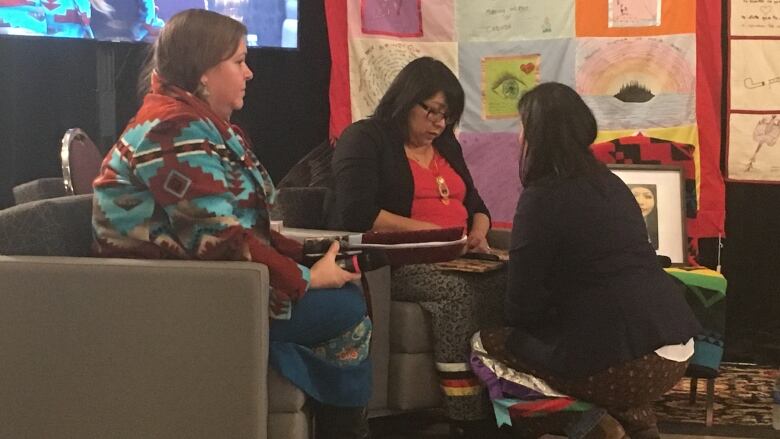MMIWG inquiry, Ottawa at odds over state of document processing system
Inquiry blames Ottawa, Ottawa says they've provided the document processing program

More thana year into its mandate, the National Inquiry into Murdered and Missing Indigenous Women and Girls says it does not yet have a centralized system in place to process case files from federal, provincial and police agencies.
The inquiry blames the federal bureaucracy, but the bureaucracy says it has provided the requested program allowing for the secure storage and retrieval of the case files.
Commission counsel Christa Big Canoe said in an interview with CBC News Wednesday morning that the inquiry doesn't have a secured centralized database on a shared drive allowing its nine lawyers to search through the thousands of case files it has already obtained.
Big Canoe said Shared Services Canada, the agency that manages IT networks for Ottawa, refuses to allow the inquiry to put Ringtail, a database and document retrieval system used by law firms, on the government's network.
"We are not able to access the documents in a way that is very usable because we use a litigation tool and our litigation tool is not being placed on the Shared Services." said Big Canoe. "You can go through files individually, but the sheer volume of files make it difficult to access if we cannot access them through a secured shared drive system."
However, a spokesperson for the Privy Council Office says the inquiry asked for Ringtail in February and it was given access to the program on the federal government network in April. It is currently accessible from computers connected to the government's network in the inquiry's offices.
The inquiry has since requested the ability to access the program remotely. It needs new government-issued laptops with the proper encryption to access Ringtail.
Privy Council spokesperson Paul Duchesne, a spokesperson for the Privy Council, said the inquiry's request for "additional functionality" would be met in an "expedited fashion."
The Privy Council, which is the federal bureaucracy's nervecentre, is the lead agency on providing inquiry support under the Inquiries Act.
CBC News asked the inquiry for a clarification following the Privy Council's response.
The inquiry did not respond to a request for additional comment.
- Missing and murdered inquiry wants task force established to review cold cases
- MMIWG inquiry commissioner says extension could mean new leadership
In its recently released interim report, the inquiry said bureaucratic red tape around IT, human resources and contracting created about an eight-month delay for the inquiry, which began its work in September 2016.
The inquiry has said it plans to seek an extension beyond the current December 2018 end to its mandate partly as a result of its problems with the federal bureaucracy.
Inquiry needs documents
Big Canoe said many of the cases handled by the inquiry cut across agencies and jurisdiction. Inquiry lawyers need access to medical, child welfare, police and coroner files, she said. The inquiry needs the filesto conduct an analysis of systemic failures that lead to the disproportionate number of Indigenous women who face violence, are murdered or go missing.
Big Canoe said the inquiry has already collected thousands of documents through agreements with the provinces, territories and police services and by subpoenas which the commissioners can issue.
The inquiry has an agreementin place with the Sret du Quebc.The RCMP, which has already transferred about 10 case files, and Thunder Bay police have responded to inquiry subpoenas.
Inquiry lawyers seemunprepared: Fraser
Suzan Fraser, a Toronto lawyer representing 18 families seeking standing at the inquiry, said it is clear to her inquiry counsel don't have the necessary documents in hand to properly question testifying families.
"It appears the inquiry has no information, has reviewed no documents as these stories are being told," said Fraser. "So the ability to ask questions and lead that evidence, in my view, is hampered. They are not able to piece that into the knowledge of what else exists."
Fraser said inquiry lawyers should be sitting with families, case files in hand, and review their testimony along with the related documentation before they appear as witnesses.
"Now they are going to have to get that information and after-the-fact plug it into the testimony they heard," said Fraser. "It's a backwards way of doing things. Normally, before putting a witness in a witness chair you would have reviewed the case thoroughly before calling that evidence."
Lillian Southwind, whose mother Viola Panachessedisappeared from Sioux Lookout on Aug. 18, 1991, testified this week at the hearings in Thunder Bay that the local Ontario Provincial Police detachment claimed to have accidentally put the missing person file into a burn pile. The second file is currently in a vault at the OPP's headquarters in Orillia, Ont.
The inquiry did not have the second file when she testified on Tuesday, said Southwind. She has now hired a lawyer to help her obtain the file.
"It would be nice for [the inquiry]to have it," said Southwind.
Southwind said she'd like to see the inquiry subpoena the OPP for the first file.
"As for the first one, see where it is," she said. "Who knows, maybe they'll find it."












_(720p).jpg)


 OFFICIAL HD MUSIC VIDEO.jpg)
.jpg)



























































































